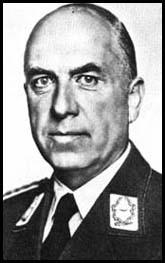Fritz Todt

Fritz Todt was born in Pforzheim, Germany on 4th September, 1891. He joined the German Army and during the First World War won the Iron Cross.
After the war Todt studied engineering before joining Sager and Woerner, a company which specialized in building roads and tunnels.
Todt joined National Socialist German Workers Party (NSDAP) in 1922 and later the Schutz Staffeinel (SS). In 1930 Todt published a paper, Proposals and Financial Plans for the Employment of One Million Men. Adolf Hitler was impressed by the paper and when he came to power in 1933 he appointed Todt as head of the new state-owned Reichsautobahnen Corporation and was given the task of building a national highway system.
Todt also helped to establish the Nationalsocialisticher Bund Deutscher Technik that helped to organize engineers and managers in the German construction industry. He also built the great defensive systems, the West Wall that protected Germany's western frontier.
In 1940 Todt was appointed as Reich Minister for Munitions. The following year he was given responsibility for restoring the road and rail system in the Soviet Union. Todt's growing importance in the party hierarchy brought him into conflict with Hermann Goering and Martin Bormann.
Fritz Todt was killed when on 9th February 1942, the plane he was on exploded soon after taking off for Munich. He was replaced as Minister of Munitions by Albert Speer who had at the last moment cancelled flying on the same plane as Todt.
